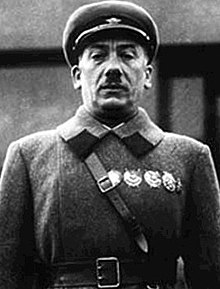
Back غينريخ ياغودا Arabic جينريخ ياجودا ARZ Henrix Yaqoda Azerbaijani Ягода Генрих Григорьевич Bashkir Генрых Рыгоравіч Ягода Byelorussian Генрых Ягода BE-X-OLD Генрих Ягода Bulgarian Guénrikh Iagoda Catalan Genrich Jagoda Czech Genrikh Jagoda Danish
Genrikh Yagoda | |
|---|---|
Генрих Ягода | |
 Yagoda in 1936 | |
| People's Commissar for Internal Affairs | |
| In office 10 July 1934 – 26 September 1936 | |
| Premier | Vyacheslav Molotov |
| Preceded by | Vyacheslav Menzhinsky (as OGPU chairman) |
| Succeeded by | Nikolai Yezhov |
| People's Commissar for Posts and Telegraphs | |
| In office 26 September 1936 – 5 April 1937 | |
| Premier | Vyacheslav Molotov |
| Preceded by | Alexei Rykov |
| Succeeded by | Innokenti Khalepski |
| Personal details | |
| Born | Yenokh Gershevich Iyeguda 7 November 1891 Rybinsk, Russian Empire |
| Died | 15 March 1938 (aged 46) Moscow, Russian SFSR, Soviet Union |
| Nationality | Soviet |
| Political party | Communist Party of the Russian Soviet Federative Socialist Republic (1917–1937) |
| Spouse | |
| Signature |  |
Genrikh Grigoryevich Yagoda (Russian: Ге́нрих Григо́рьевич Яго́да, tr. Genrikh Grigor'yevich Yagoda, born Yenokh Gershevich Iyeguda; 7 November 1891 – 15 March 1938) was a Soviet secret police official who served as director of the NKVD, the Soviet Union's security and intelligence agency, from 1934 to 1936. Appointed by Joseph Stalin, Yagoda supervised arrests, show trials, and executions of the Old Bolsheviks Lev Kamenev and Grigory Zinoviev, climactic events of the Great Purge. Yagoda also supervised construction of the White Sea–Baltic Canal with Naftaly Frenkel, using penal labor from the gulag system, during which 12,000–25,000 laborers died.
Like many Soviet NKVD officers who conducted political repression, Yagoda himself ultimately became a victim of the Purge. He was demoted from the directorship of the NKVD in favor of Nikolai Yezhov in 1936 and arrested in 1937. Charged with crimes of wrecking, espionage, Trotskyism and conspiracy, Yagoda was a defendant at the Trial of the Twenty-One, the last of the major Soviet show trials of the 1930s. Following his confession at the trial, Yagoda was found guilty and shot.
© MMXXIII Rich X Search. We shall prevail. All rights reserved. Rich X Search